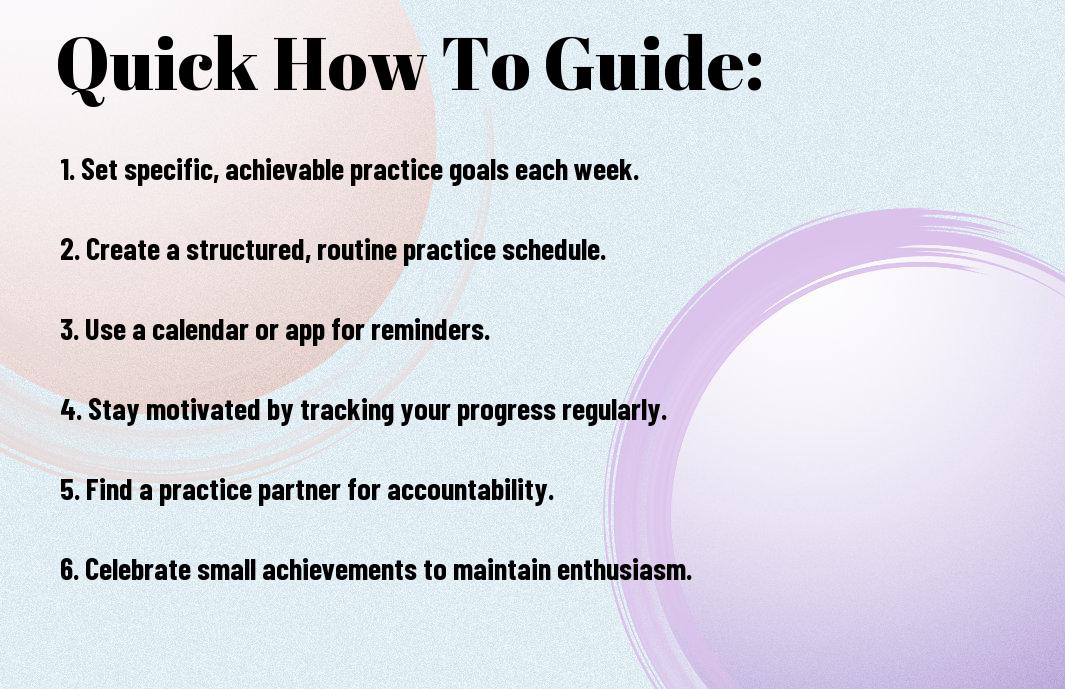Consistency is the key to improving your performance and achieving your goals in sports. Whether you’re a beginner or an experienced athlete, establishing a regular practice routine is imperative for honing your skills and building endurance. In this guide, you’ll discover practical strategies to help you stay committed and motivated, ensure your training sessions are productive, and ultimately elevate your game. By following these tips, you can transform your approach and cultivate a consistent practice that leads to success on the field, court, or track.
Key Takeaways:
- Set Clear Goals: Establish specific, measurable, and realistic objectives to work towards in your practice sessions.
- Create a Schedule: Develop a consistent training routine that fits into your weekly calendar to ensure regular practice times.
- Track Progress: Keep a log of your performance and improvements to stay motivated and make necessary adjustments.
- Stay Motivated: Find your source of inspiration, whether it be through visualization, support from teammates, or personal ambition, to keep pushing forward.
- Embrace Challenges: Approach setbacks as learning opportunities to grow and enhance your skills during practice.
How to Set Clear Goals
While developing consistency in your sports practice, setting clear goals is important for maintaining focus and motivation. Clear goals give you a roadmap for your training and help you track your progress over time. When you know what you’re aiming for, it’s easier to stay committed and adjust your practice strategies as needed.
Defining Short-Term vs. Long-Term Goals
Little can be achieved without a clear understanding of both short-term and long-term goals. Short-term goals are immediate objectives that help you build skills and confidence, while long-term goals are broader aims that shape your overall direction in sports. Balancing both types ensures consistent progress and keeps you engaged and motivated.
Importance of SMART Goals
Defining your objectives as SMART goals—Specific, Measurable, Achievable, Relevant, and Time-bound—strengthens your commitment and enhances your focus. By setting SMART goals, you create actionable steps that lead to measurable results, making it easier to assess your achievements and identify areas for improvement.
This structured approach not only clarifies what you want to achieve but also provides a clear framework for evaluation. Knowing exactly what each goal entails allows you to track your progress effectively, and regularly assessing your achievements can keep you motivated. Goals that meet the SMART criteria provide the clarity you need to stay on track and maintain consistency in your sports practice.

Tips for Creating a Consistent Practice Schedule
Clearly, establishing a consistent practice schedule is vital for your development in sports. Consider these tips to help you stay on track:
- Set specific days and times for practice.
- Utilize a calendar or app to plan your sessions.
- Prioritize your practice just like you would a meeting.
- Add variety to keep your sessions engaging.
- Share your schedule with friends or teammates for accountability.
Recognizing the importance of a structured routine can streamline your performance. For more insights, check out 9 Tips to Achieve Performance Consistency in Sports.
Ideal Frequency and Duration
Any effective practice schedule should take into account both frequency and duration. Aim for a balance that allows you to hone your skills without leading to burnout. Depending on your sport, 3-5 practice sessions per week, lasting 1-2 hours each, can be ideal.
Balancing Practice with Recovery
Creating a successful practice routine involves not just the active training time but also ample recovery periods. Striving for a balance between exertion and rest is important for peak performance.
It’s important to listen to your body when scheduling recovery. Overtraining can lead to fatigue and injury, detracting from your overall performance. Incorporate rest days into your agenda, allowing yourself to recuperate fully. Complement your practice with light activities like stretching or yoga on off days, which can enhance recovery and maintain your momentum. Ultimately, a well-rounded approach is key to sustaining your practice without sacrificing your well-being.
Factors that Influence Consistency
All athletes face various factors that can impact their consistency in practice. Understanding these elements can help you create a more effective training routine. Key factors include:
- Time management
- Mental resilience
- Physical health
- Environment
- Support system
After identifying and addressing these factors, you can significantly improve your training consistency.
Mental Preparation and Focus
That mental preparation is imperative for maintaining focus during your practice. Developing a pre-game routine or visualization technique can enhance your concentration and help you tune out distractions, allowing you to better commit to your training goals.
Physical Conditioning
Conditioning your body adequately is fundamental for sustained athletic performance. Without proper physical conditioning, your body may fatigue quickly during training, leading to inconsistent practice sessions. Prioritizing strength, flexibility, and endurance will not only enhance your performance but also reduce the risk of injury, fostering a stronger training commitment.
It’s important to create a balanced conditioning regimen that includes cardiovascular workouts, strength training, and flexibility exercises. This comprehensive approach ensures your body can handle the demands of your sport, which translates into lasting consistency during practice. Regular assessments of your conditioning levels will help you adjust your training as needed, keeping you engaged and on track with your goals.
Building Motivation and Discipline
Once again, developing consistency in your sports practice hinges on cultivating both motivation and discipline. Motivation provides the initial spark that drives you to set goals and train, while discipline fosters the ability to stay on track, even when enthusiasm wanes. By establishing a routine and prioritizing your practice, you can build the mental fortitude needed to push through challenges and stay committed to your athletic journey.
Finding Your ‘Why’
For effective motivation, you need to identify your ‘why’—the underlying reason driving your commitment to sports. This could be a personal ambition, a desire to improve your health, or the thrill of competition. When challenges arise, reflecting on your ‘why’ can rekindle your enthusiasm and remind you why you committed in the first place.
Techniques for Staying Committed
If you want to maintain your commitment, implementing specific techniques can make a difference. Create a structured training schedule, set measurable goals, and track your progress. Engage with a supportive community or training partner to hold yourself accountable and celebrate achievements together.
Staying committed requires a proactive approach. Develop a routine that aligns with your lifestyle, and utilize tools like reminders and apps to track your workouts. Consider visualizing your goals and how achieving them will impact your life positively. Engaging with a coach or joining a training group can provide the accountability that reinforces your discipline, making it easier to stay consistent in your practice.

Using Technology to Enhance Practice
For athletes aiming to develop consistency, leveraging technology can be a game changer. From wearable devices that monitor your performance to video analysis software, these tools can provide valuable insights into your training routine. By integrating technology into your sports practice, you can analyze your strengths and weaknesses, optimize your workouts, and ultimately enhance your performance. Staying up to date with the latest technological advancements will keep you on a competitive edge.
Apps and Tools for Tracking Progress
Tracking your progress is vital for building consistency. Various apps designed for athletes allow you to log workouts, monitor performance metrics, and set achievable goals. These tools can provide real-time feedback, making it easier for you to understand your progress and areas that need improvement. With consistent tracking, you can effectively adjust your practice routines to maintain a steady path toward your athletic goals.
Utilizing Online Resources
With so much information available online, you can find a wealth of resources that support your training. Websites, forums, and social media platforms dedicated to sports and fitness provide coaching tips, workout plans, and community support to keep you motivated. You can harness these expansive digital resources to find inspiration and share experiences with peers, which can greatly enhance your practice consistency.
Another way to utilize online resources is by engaging with instructional videos and webinars, offering expert advice tailored to your sport. Following prominent athletes and coaches on social media allows you to gather insights and tips directly from those at the top of the game. Online communities and forums can also facilitate discussions about techniques and strategies, empowering you to adapt and refine your approach. By tapping into these diverse online resources, you’ll identify new training methods and stay informed about the latest trends in your sport.
Overcoming Common Barriers to Consistency
Despite the passion and determination you have for your sport, various barriers can hinder your ability to maintain consistency in practice. These obstacles might include scheduling conflicts, lack of motivation, or even external pressures. Understanding these challenges is the first step in overcoming them. By identifying what specifically affects your routine, you can develop strategies to navigate around these barriers effectively and keep your commitment to improvement strong.
Dealing with Setbacks
You will inevitably face setbacks during your journey to consistency, whether due to injury, fatigue, or moments when your motivation wanes. Rather than view these setbacks as failures, consider them opportunities for growth. Analyzing what led to the setback allows you to adjust your training approach, preparing you to overcome similar challenges in the future. Each setback can be a stepping stone toward greater resilience in your practice.
Building a Support System
Building a support system can significantly enhance your commitment to consistent practice. Surrounding yourself with individuals who share your passion or who encourage your goals can provide motivation and accountability.
For instance, joining a local sports club or training group can offer you camaraderie and a sense of belonging. Having training buddies can keep you accountable for your practice schedule, while coaches and mentors can provide valuable guidance and support. Additionally, sharing your goals with family and friends can further strengthen your resolve, as they become part of your journey, cheering you on and helping you stay focused when you encounter challenges.
Conclusion
Presently, developing consistency in your sports practice requires dedication, strategic planning, and self-discipline. By setting clear, achievable goals, creating a structured schedule, and regularly assessing your progress, you can build a strong foundation. Prioritizing both physical and mental well-being will enhance your resilience and focus during training. Engaging with coaches or peers for support can also reinforce your commitment. Ultimately, when you consistently apply these strategies, you will see improvement in your performance and enjoy the process of athletic growth.
FAQ
Q: What are effective strategies for maintaining consistency in sports practice?
A: To develop consistency in your sports practice, start by creating a structured routine. Set specific days and times for training sessions each week. This helps establish a habit. Consider using a calendar or planner to track your sessions. Additionally, establish clear, attainable goals to keep yourself motivated. Gradually increase the intensity and duration of your practices to challenge yourself without leading to burnout. It’s also beneficial to find a training partner or join a group, as accountability can enhance your commitment.
Q: How can I overcome mental barriers to being consistent in my sports practice?
A: Mental barriers can significantly impact your consistency. Start by identifying specific fears or doubts you may have about your abilities or outcomes. Use positive affirmations and visualization techniques to build your confidence. Setting small, incremental goals can help create a sense of achievement and motivate you to keep going. Incorporating mindfulness or relaxation techniques, such as meditation or deep breathing exercises, can also support you in staying focused and reducing anxiety associated with practice.
Q: How do I balance consistency in practice with other life commitments?
A: Balancing sports practice with other responsibilities requires careful planning. Start by evaluating your current schedule and identifying blocks of time that can be dedicated to practice. Prioritize your sports goals by treating practice sessions like important appointments that cannot be missed. Communicate with family or colleagues about your schedule, so they can support your commitments. Be flexible and willing to adjust your practice times when necessary, but ensure that you maintain regularity by finding alternative times to train, even if they are shorter.

